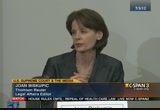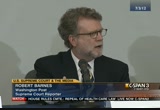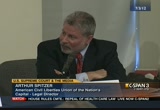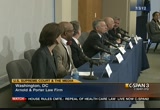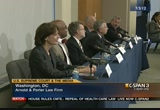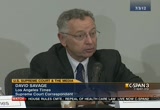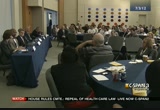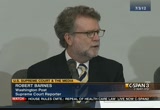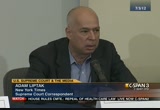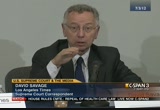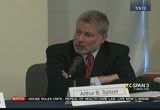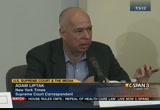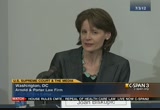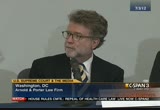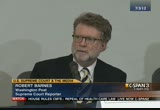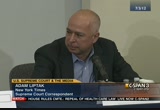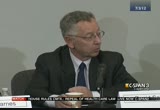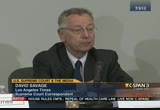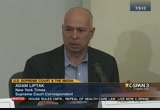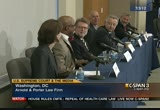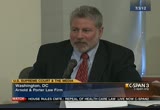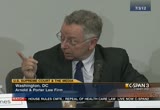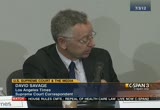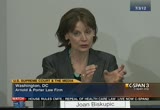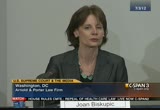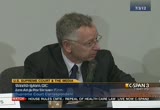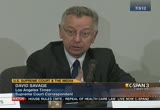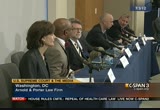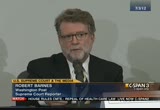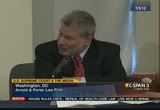tv [untitled] July 9, 2012 5:30pm-6:00pm EDT
5:30 pm
clear. he knew what he wanted to say and he might be suggested by the idea that at one point was in one direction and then switched in mid-stream and went in the other direction. >> i think it's very interesting too. you haven't read the opinion you would be interested in the way it is structured. most of what is the majority opinion is roberts speaking for himself. the decent from the conservatives reads very much like their own opinion that addresses justice begins berg a little bit. it does not address justice roberts's writing almost at all and goes through all of the issues that were in front of the court including serfability that
5:31 pm
really shouldn't have come do into play since the mandate was upheld under the taxing power. it's a very unusual opinion i think and certainly from what justice begins berg wrote you would think that the liberals on the court had lost rather than won. until the very end. >> you can look at the stories that have been printed lately to see the depth of the anger going on upstairs in the supreme court. they are usually really good about not leading anyone know what's going on upstairs. we are seeing leaks about deliberations. that's very rare. this is the type of information you see about 20 years later. there is clearly anger in the building. >> i am still curious what you all think is meant by the carefully-chosen phrase, specific knowledge of the
5:32 pm
deliberations. i certainly assume that doesn't mean a justice. how far? >> why do you assume that? the justice might have specific knowledge. >> a justice certainly would have specific knowledge and could include a justice, but if she meant to policy it was a justice, it would be direct knowledge. at least she is leaving ambiguity. >> a nice phrase said lots and lots of people is a way to protect your sources. >> one of the things that is really dangerous is to try to part the exact meaning of where they were without asking the reporter. all we know is the paint. when you are dealing with sources, you have to be specific enough that people know where it's coming from without letting them know where it's coming from. that's what he did. >> is there widespread suspicion on this panel that she heard
5:33 pm
from justices themselves as opposed to law clerks? >> it wouldn't be right to speculate. >> you speaking for the panel? >> he is speaking for me. >> second. >> no speculation here. it seems like almost every commentator that i read or have seen assumes this was a political decision one way or the other. the liberals are happy it was a decision and the conservatives are very upset it was a political decision. does anyone think it's possible that roberts called it he saw it and worked through the issue and decided this was -- >> what's the definition? of a political decision. >> go ahead. >> i'm asking you. you said everybody said it's -- >> a decision is made for reasons outside the law. in other words, a decision made
5:34 pm
to save the prestige of the court and a decision made to save the nation from political trauma. all kinds of possible reasons. political with a small p. that presumably a law professor in the academy with no care about what happened elsewhere, a decision from what they might come from. >> i don't think it was a political decision. i think robert his the view and said it before that the court had a duty to uphold a law of congress if there was a constitutional basis for doing so. he didn't think it could be upheld urn the commerce clause. he didn't think the medicate requirement could be upheld, but he did think it could be upheld as a tax. that was a reasonable way to decide this case. it avoided the court striking
5:35 pm
down a major act of congress. they haven't struck down the law since 1936. it's what he thinks he should do which is to give the laws the benefit of the doubt that you would vote to upheld them. >> this was no more regulatory act. this was a democratic president ha we described it so many times. the signature achievement of his domestic agenda. it was a high hurdle in terms of do you defer to the elected branches, the congress. a decision making. it's funny how you raise the question. we're sitting here in front of a bunch of lawyer who is get that maximum decision making that you go narrowly and try to uphold something if you can. i do think it served a couple different purposes for the chief
5:36 pm
justice and the supreme court. one was calling it as he felt the law dictated. >> i give him the benefit of that doubt too. striking how little of that i have seen in the general reaction. i wondered whether you guys covered the supreme court think it's your job to say in what you print, maybe he actually did call it as he saw it. >> i think you do that when you cover the decision. you gift reasons why the court said that it did what it did. i think that's what you do in those things. the reactions that it was political as i talk about it a little bit in a story, it was all from the left at first. this was going to be a political
5:37 pm
decision and a partisan that strikes down the law. it's coming from the right. those are reactions that i think come from the fact that this is a very divicive piece of legislation. the public is very split on it. we have a poll out that i think it's almost exactly even, the number of people who think the court did the right thing and the number of people who think the court did the wrong thing. that certainly does show that it's something that is pushed and probably should be pushed into the political rim and thus if people want to overturn it, they know who to vote for who promised to overturn it. >> one point about polls. my favorite number was one i saw yesterday. 41% of americans don't know that there is has been a health care decision. then to follow-up, i think we
5:38 pm
did a -- the wire services and the newspapers did a first-rate job in explaining the actual legal substance of these decisions. i think we were under enormous pressure and speaking for myself on behalf of my colleagues, i think it worked out great and my news walked through to the points you were making and even quoteing for the chief justice roberts's opinion that if there was a plausible basis on which to uphold them subject to multiple interpretation, it's your duty to defer to congress if you can. >> for you look at that decision, you are not following it. >> you might say eight of the nine voted as you would have
5:39 pm
guessed the four democratic appointed justices voted to uphold a law passed by a democratic congress and signed by democratic president opposed entirely by republicans. the four other republican justices voted to strike down that law entirely all 900 pages of the law passed by a democratic congress and signed by a democratic president. they voted in a way you wouldn't have guessed looking at his background. a republican appointee and conservative justice voted to uphold the law. it seems to me that the last person you ought to say is that made a decision that is political. it should be john roberts. >> there is another piece about this law is that very few people around the country get as a legal matter and i wonder if any
5:40 pm
of you felt it was part of your job to explain it or have tried to explain it. that is when massachusetts passed a similar law like sometimes it's called romney care, there was no constitutional lawsuit as far as i know. there was no question about the state's power to do that. yet here was this major question about whether the federal government did that. in the first few pages of his opinion to explain that difference, you guys had 185 pages worth of opinions to try to put into a report. is that something any of you have written about in the course of covering this issue? is that something that you think is important to try to convey or something that people don't think or care about or need to know? >> i recall doing a piece and think it ran on the front page about justice kennedy's conception of liberty and
5:41 pm
something that is baked into the federal structure. that's a different liberty than the due process, the basis on which to attack a state-issued mandate. i think that distinction came up and maybe not enough. i'm not sure most people could articulate the difference between what the limits on a state-enact and federal-enacted mandate might be. >> every time i wrote about it, i get an e-mail making that point. i have to pay for car insurance here in california. i write back the federal government has different powers and not a very satisfying rational. people should be asking the question as they are this week. does romney care get enforced with a tax? that's the big question to think about. >> you make the point about how much we explain or not explain. often we are limited in terms of
5:42 pm
what we believe the public's appetite is about a case. in this case, almost all of us wrote about the commerce clause and the taxing power and the legal issues that were with the more popular political question mostly because we had a long run up and people had an appetite for all things health care. more of an incentive than on other times when we tackled federalism issues. most of us who lived through the 90s which was the big era at the supreme court. it was so difficult to explain. this time they were so interested in the topic. it was easier for us to the federal powers. >> we have all talked about this aspect which is there has been more interest in this case than
5:43 pm
anything that i have ever covered at the supreme court. i have been asked about it by literally everyone i meet who knows what i do. the appetite, believe me has been there for stories both from the public and much more importantly from the editors. >> for this paper is to be believed, you called the case exactly right. >> how much preparation did you have to do for this case? i assume you read at least the major briefs. do you feel you need to read them all and educate yourself on how the affordable care act works? how deeply did you dig in in anticipation of the decision in. >> i don't know how it works. i knew the legal issues and that's what i felt like we needed to know. we have lots of people at the
5:44 pm
paper who do know a lot about how it works or will work or won't work. this was another one of the huge, huge things that -- i thought in a way almost became unmanageable. there were so many briefs. there was so much information there. i think that you sword of depend on some people to point you to the ones that they think are the most important or the ones that they think will shape their argument on both sides. there were a million beliefings on this by interest groups and conservative groups and liberal groups and after a while, i think we all had a pretty good idea what the issues were. >> i don't think our practice is terribly different from the justices. i read all the briefs and the sg's briefs and the briefs from advocates i trust and the briefs from interest group who is have
5:45 pm
something interesting to say and i don't read every brief and nor do the justices. >> at the end-all of us had to figure out how to best be prepared. by the time we got to mid-june, it could come any day. the trick was how do we really be red for whatever they are going to do? that's when you have a question of do you go back through the beliefs or the oral arguments or how do you get ready? many of us had to prewrite the versions and i found that again, you get selective and you decide i went back just to the oral arguments and actually just to the government's belief to look at the arguments on commerce clause and power in the taxing only because you only have -- probably all of ours were the same. surrounded by a sea of paper and it's a matter of what it will be most useful when the time comes to distill the document that we get. >> i thought this was interesting for many, many
5:46 pm
reasons other but going into the argument, most of us thought the court was likely to uphold the law because of the long precedent on the commerce plauz. we sat through and came out thinking wow, they are going to strike down the entire law and it looks like not don't did they not buy the commerce argument, it looked like the interview was we have got to strike down the entire law if the mandate goes and we went to the medicate argument and they bought the idea that the medicaid expansion was unconstitutional too. it went through a period thinking wow, john roberts will not want to go along with striking down that entire law. i remember about a month ago saying to my daughter that i thought they would strike down the mandate and uphold the
5:47 pm
taxes. suppose congress passed a law that said american families are required to have children or pay a tax penalty. the first part of that is you say that has to be unconstitutional. the government couldn't require to you have children. the second part, if you don't have children, you pay higher taxes, that's the way our system works. my daughter said dad, did you put that in the paper? i said it's too simple for legal work. i couldn't do that. that's the way it will come out. >> too bad you didn't put it in the paper. >> i did write a paper saying you would split the middle that ran the weekend before the decision. >> so what were the mornings like last thursday? how did the day go? >> they were dramatically different for two sets of us. some of us were in the courtroom that turned out to be a huge blessing.
5:48 pm
you could hear, digest, understand, have the chief justice explain what he considered to be the holdings. that was old school. we were up there for the better part of an hour while the rest of the world was making mistakes. not jesse. we were down stairs and i love to hear what that was like. i haven't heard it yet. >> one of the things we did before monday is that we set up a system where we had certain code words and literally we were standing no less than feet away, but we wanted to make sure we could get that opinion out as fast as possible. and we had an open line waiting for the code words on what it was going to be.
5:49 pm
>> can you reveal the code words? >> it was really simple. uphold the mandate and the mandate was premature. once mark got to the correct part of the decision and saw it, he relayed the message back to him. i had on my mind the football game where the guy calls in the air and misses what he said. i wanted to make sure we were using the code words and all of this happens within a minute and we file and we split up the decision. he read the majority opinion and i read the descent and we ran from there. >> should i give the audience a background. some members of the press sit
5:50 pm
out in the press gallery that is on the left hand side if you are sitting in the audience. usually they get up and leave when they are finished being handed down. they have 100 to other business. but, there's also a press room one floor below which has a speaker and you can hear the audio as the decisions are handed out public information office hands out copies of the decision. so, if you are sitting down there, you can be on your laptop transmitting, i guess -- >> they wouldn't allow you to take -- >> no electronics? >> no devices in the room. we couldn't have electronic devices in the room. >> was that usual practice or for this specially? >> usual. >> i don't know that people care so much. >> this is the first one that i
5:51 pm
remember. it was a really big decision in the web era. it used to be you had to do this. i remember the stories from the time i started, like at the decision that, you know, they hand out the opinion. alan wins on a 5-4 vote. they strike down the university of california affirmative action plan. maybe you studied that in law school. but, everybody knows the decision for the last paragraphs said but, universities may use race as a plus factor. reporters who had to jump that day in 1978, the first thing you do is say alan won. university of california lost. a big defeat for affirmative action. turned out not to be true. all of us wanted to rush on this. i wanted to look at the syllabus and go through each point and make sure i counted the votes right. i thought there's a good chance
5:52 pm
that on the tax power they might do it. i stayed downstairs. adam -- it would have been nice to be up there for history, but our website wanted to post something quickly. i wrote a couple pieces in advance, one was upholded on a tax power. i went through the syllabus. it took me a minute. i went back and called the desk, said post the story on tax power. it was a lot of fun because there's always the danger, i didn't watch the tv coverage. i take it some of you might have. there's always the danger of making a fool of yourself by being the first one up with the wrong story. >> that was sort of the beauty of being in the courtroom. it wasn't unlike the switch in some ways. as the chief announces his opinion, it goes on, the whole thing takes 20 minutes with him and justice ginsburg and kennedy
5:53 pm
reading. if you were sitting there and about to dash off with when he got to the first conclusion, you would have left with the hammers clause, grounds don't justify the individual mandate because he spins all that out. then he moves out to the taxing levy here. what it helps you do when you are sitting there is to digest the different pieces. the thing was equally helpful to be up there for was medicaid. he gets to the point where he says the medicaid expansion is struck down. unlike david, i never thought they would strike that down or go that far. i thought it would be so dangerous and they wouldn't do it. he's saying something. oh my god, this is a huge thing they have done. but there's a remedy. we are all sort of whispering to ourselves. does that mean it's saved and that's what it did mean. it's like you were in some ways being read a story and you can
5:54 pm
digest it in a way that is easier than what david and jesse had to do in the press room. the person who aged was solicitor sitting in front of the justices as close as this and roberts took that guy on a roller coaster ride. no on commerce clause, wait on taxing, up on medicaid, wait, there's a way. i felt bad watching him. >> that was the end of a three month roller coaster ride. >> right. >> adam, you have written about this, i think, unless i'm mixing you up with somebody else. his ultimate vindication. does anyone want to -- >> that's another fascinating story because i wrote something that said he may have lost on style points but won the case.
5:55 pm
everyone gave don a hard time, particularly the loggers on the left that were mercyless taking the metaphore that he was caught in the throat as a sign he had blown the case or flubed the case. anybody who follows the court knows they don't decide cases based on that. they care a lot about the briefs. dawn insisted on keeping the tax argument in the case. made a very good presentation about saying if you look at how the law works, it's not a mandate. you don't get prosecuted or taken to jail. all it is is a tax law. it works like a tax. therefore it can be upheld as a tax. paul didn't really have a powerful comment to that. i thought it's one of those really interesting stories that everybody wrote about how don
5:56 pm
lost the case and oral argument greatly overstated. it ends up, his argument turns out to be the winner. >> um -- as you all know, they are doing a live blog on decision days and on thursday they reported they had 866,000 people tuned into their live blog at one point and more than 3 million hits to the website by 1:00 that afternoon. does that fact change the job that you do at all? the fact that people have direct access to the news as it's breaking, easy access to opinions within minutes of coming down or is it really such a different audience that it doesn't matter? >> i'll add that it's what we do
5:57 pm
anyway in addition to writing stories. i write the twitter site. that same morning, while we are going through it, i'm tweeting at the same time. so, it's while we don't have the specialized audience that goes by, we have a general audience. we publish to everybody. but, what they are doing is what we started doing years ago. we do it in a different way. >> so, where were you that you could twitter? not in the press room with no electronics? >> i was in the, where our offices are in the press room reading and tweeting at the same time, writing at the same time. >> to your larger question, it's really, of course, for newspaper reporters change lives completely. you know, people want things very quickly. they want to be able to come to the website and find out what happens. they want alerts. they want twitter feeds. you know, it is really a huge
5:58 pm
difference. we, a little bit, you know, we had an hour long meeting about what the alert possibilities could be. that we could make sure would be correct. we sort of disposed of saying health care upheld because we thought it would be too much of a split decision so we went with an individual mandate upheld or individual mandate struck kind of alert possibility. so, you think about these things that you never thought, you know, in a million years you would be thinking about. >> the blog is a very good sight, terrific resource. competition is good. sources of information is good. i'm delights they are there. >> unless you have something else to say about health care, maybe we should move on to other things. was there something else?
5:59 pm
justice scalia didn't have anything orally to say on thursday, but last monday decented from the supreme court decision in sv 1050 case, the immigration case. there's been a lot of commentary about his decent especially president obama's decision to exempt certain people from immigration enforcement action, something obama announced after the case had been argued. let me start with david. you started covering the court about when scalia arrived. was this normal scalia or a step beyond? >> well, it's a lot of normal scalia. i thought for 25 years all supreme court terms end with decisions late in june and one firy scalia decent. i think there's been no year, almost every year, there's really scalia lam
65 Views
IN COLLECTIONS
CSPAN3 Television Archive
Television Archive  Television Archive News Search Service
Television Archive News Search Service 
Uploaded by TV Archive on

 Live Music Archive
Live Music Archive Librivox Free Audio
Librivox Free Audio Metropolitan Museum
Metropolitan Museum Cleveland Museum of Art
Cleveland Museum of Art Internet Arcade
Internet Arcade Console Living Room
Console Living Room Books to Borrow
Books to Borrow Open Library
Open Library TV News
TV News Understanding 9/11
Understanding 9/11